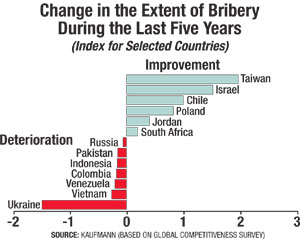 |
| Ethics Pushers. McCarthy (left) and Henry (right) talk progress at ASCE forum. (Photo by Nadine Post for ENR) |
"In developing countries, often the engineer has the highest status," said Henry, marketing manager for Schaaf & Wheeler Consulting Civil Engineers, Seattle, during a forum on global ethics at ASCEs 2005 Annual Civil Engineering Conference, in Los Angeles, Oct. 27-29. ASCE hopes to use that status to help rid construction projects of bribery, kickbacks and payoffs.
The goal is to create a critical mass of engineering and construction societies and companies that refuse to engage in corrupt practices, often viewed as business-as-usual in many societies. A single company is powerless to change the culture, but Henry and others believe there is strength in numbers.
"We the undersigned, as leaders in the global engineering community, recognize that corruption in all forms diverts resources from projects intended to raise living standards, threatens sustainable development, impoverishes communities and tarnishes the reputation of the profession," states the ASCE charter.
Signatories pledge to "join in the battle against bribery, fraud and corruption" worldwide. Signatories agree to the enforcement of anticorruption guidelines by reporting infractions by any participant, according to the charter.
By signing on June 14, Henry launched the campaign for signatures. Others followed from the U.S., Colombia, Spain, the U.K., Italy, India, Panama, Mexico, Egypt, Jordan, Finland, Korea, Thailand, Austria and more. Representatives of China and Taiwan engineering societies are the most recent signers.  Click here to view image
Click here to view image
At the forum, a spokesman for Japans society of engineers said that Japan "supports the struggle to eliminate corruption," but had declined to sign, largely because of the compulsory requirements to report noncompliance.
ASCE also is committed to cooperating with Transparency International and the World Bank, in the war against fraud. "The World Bank has zero tolerance of corruption in any form in its projects, and under President [Paul] Wolfowitz, has increased its expectations of its partners in development to also adopt zero tolerance of corruption," said Thomas McCarthy Jr., head of the banks department of institutional integritys voluntary disclosure program.
The program, now in a pilot stage, represents the banks shift from reactive to proactive regarding corruption, said McCarthy. Under the program, names of companies and individuals disclosing corruption will be kept confidential, he added.
 |
On another front, ASCEs board of direction on Oct. 25 approved the formation of a nonprofit corporation called the Building Security Council, which is developing a security rating system for use "voluntarily" by commercial building owners. The system is modeled after the U.S. Green Building Councils LEED rating system. Assuming approval by the Dept. of Homeland Security under the SAFETY Act of 2002, BSC is scheduled to begin rating buildings in April and certifying designers by January 2007.
The rating system will be "very comprehensive in scope, encompassing virtually all aspects of design and operation," says Stan R. Caldwell, former chair of the BSC task committee and vice president of Halff Associates Inc., Dallas. The average fee will be $20,000, adjusted for size, use and complexity.
At the meeting, with 800 attendees, Dennis R. Martenson, senior project manager for CDM, St. Paul, Minn., became ASCEs 2006 president.
Coming up in July is a board of direction vote on a proposed strengthening of canon six of ASCEs code of ethics. Draft language requires contract documents to specify zero tolerance of bribery, extortion or other fraud and states "engineers shall be duty-bound" to report observed violations of the code. ASCEs 137,000 members are encouraged to provide comment through April.
he global ethics initiative of the American Society of Civil Engineers got a boost recently with news of the upcoming launch of the World Banks voluntary disclosure program against corruption. But even without bank support, the ASCE program is gaining momentum, says its main driver and 2005 ASCE president, William P. Henry. As of last week, there were nearly 70 signatories from engineering societies and leaders within and outside the U.S. to ASCEs Engineers Charter, Combating Corruption in Engineering and Construction.


